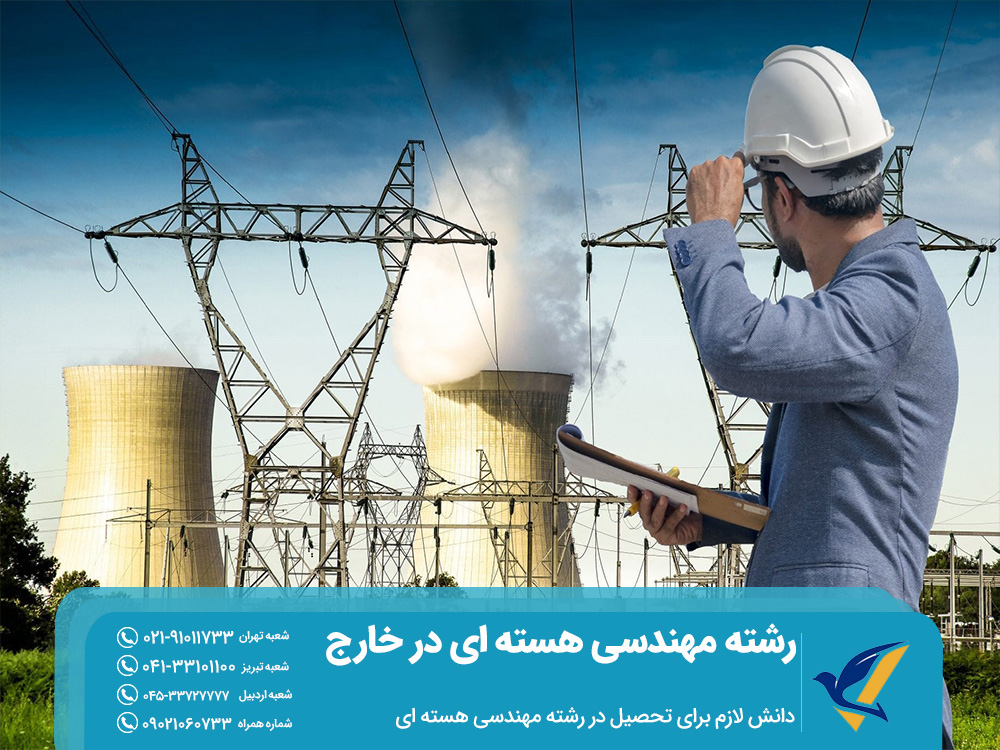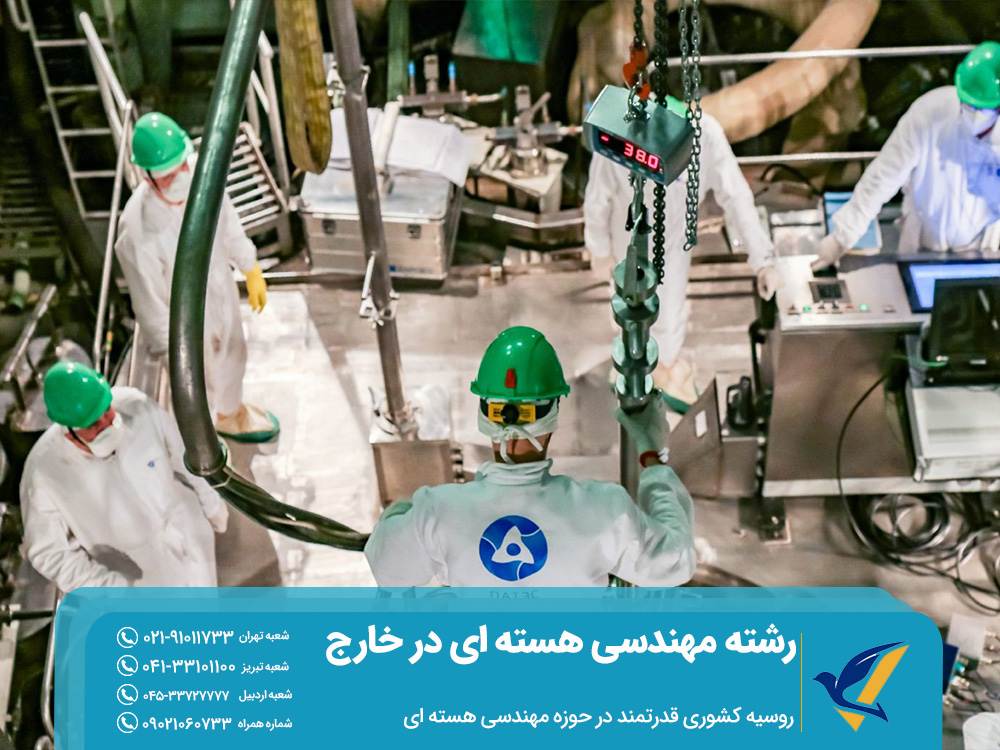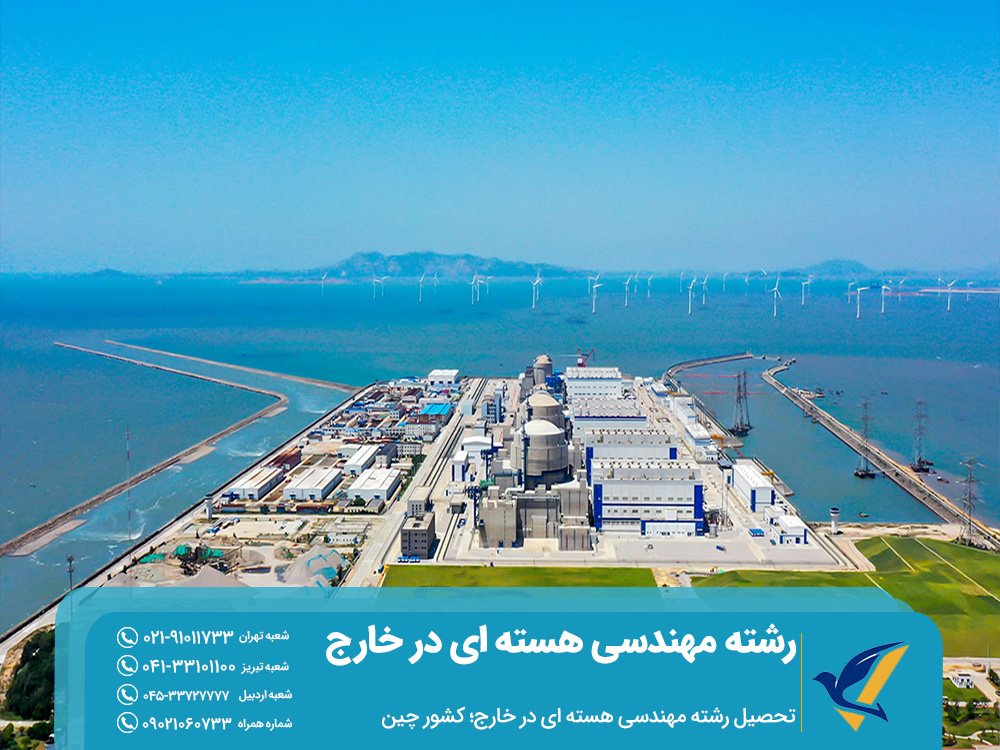Nuclear energy is one of the emerging sources of energy that can significantly contribute to solving global energy crises. As a result, pursuing a degree in nuclear engineering abroad can be an excellent option for those interested in this field due to the many opportunities it offers.
Many countries offer top-tier nuclear engineering programs and every year, numerous students apply for such programs. When choosing the best universities for nuclear engineering abroad, factors such as the quality of education, university reputation, tuition costs, and living conditions must be taken into account.
Nuclear engineering professionals design, construct, and develop nuclear reactors, conduct research in various nuclear fields, manage nuclear materials, and engage in many other foundational activities. This article provides an overview of the various aspects and conditions of studying nuclear engineering abroad.
About Nuclear Engineering
The world today faces an energy crisis, and governments are searching for ways to secure energy sources. Nuclear energy is a promising solution to many issues, including electricity shortages, reducing fossil fuel consumption, and addressing environmental pollution. Nuclear engineering focuses on the processes of nuclear energy production and its applications, including the development of technologies for nuclear power plants, medical research, lasers, accelerators, and more.
- Additionally, nuclear engineering professionals are involved in ensuring the safety of nuclear power plants, managing nuclear waste, protecting people and infrastructure from radiation, and reprocessing nuclear fuels.

Required Knowledge for Studying Nuclear Engineering
To pursue a degree in nuclear engineering, either domestically or abroad, students must have a strong interest and capability in research, science, and technology. Nuclear engineering is a complex field encompassing vast areas of study. Due to its sensitivity, the nuclear engineering program aims to train skilled and proficient specialists who are capable of performing research, designing, producing, maintaining, using, and optimizing nuclear equipment.
To be eligible for a nuclear engineering program or to apply for it, the following knowledge and skills are essential:
- Interest in Research and Scientific Work
- Strong Organizational and Planning Skills
- A Deep Passion for Science and Technology
- Solid Foundation in Mathematics, Physics, and Computer Science
- Problem-solving and Analytical Thinking Skills
- Effective Communication and Teamwork Abilities
- Attention to Detail
Fields of Activity in Nuclear Engineering
Students and graduates of nuclear engineering, whether from foreign or domestic universities, must excel in mathematics and be prepared for research activities. Some typical fields of activity for this degree include:
- Medical Applications (e.g., radiology)
- Agriculture and Food Production
- Industrial Research and Development
- Energy Sector (e.g., nuclear power generation)
- Military and Defense (e.g., designing nuclear submarines)
A nuclear engineer educated at the best nuclear engineering universities, whether abroad or at top domestic institutions, will become familiar with areas such as nuclear fuel processing, reactor design, and construction, ensuring safety methods for nuclear waste disposal, and overseeing nuclear facilities. Advanced studies in nuclear engineering abroad provide a strong foundation in these topics.
- Countries like the USA, Russia, Australia, Canada, China, and Japan offer highly specialized nuclear engineering programs, making them popular destinations for students looking to pursue this field abroad.

Top Countries for Studying Nuclear Engineering Abroad
For students looking to pursue nuclear engineering, factors such as university quality, reputation, education level, job market, and tuition fees are crucial. Some of the leading destinations for studying nuclear engineering abroad include the United States, France, Japan, the United Kingdom, and Australia. However, countries like China, Russia, and Turkey are also emerging as good study destinations due to their advanced facilities and reasonable tuition fees.
1. Nuclear Engineering in the United States
The United States stands out as one of the most important countries for studying nuclear engineering abroad. The country manages over 30% of global electricity generation through nuclear energy. The U.S. has strong expertise across various domains, including nuclear energy, and its universities are highly regarded in this field.
Nuclear engineering in the U.S. has a strong job market, with companies actively hiring fresh graduates. Programs are available at all levels, including bachelor’s, master’s, and Ph.D. The undergraduate nuclear engineering program in the U.S. is a four-year course, with annual tuition fees ranging from $27,000 to $52,000.
Some of the best nuclear engineering universities in the U.S. include:
- University of Michigan
- Stanford University
- University of California, Berkeley
- Massachusetts Institute of Technology (MIT)
- North Carolina State University
- For further details about studying nuclear engineering in the U.S., you can refer to educational websites and university admission pages.

2. Studying Nuclear Engineering in the United Kingdom
One of the key goals for the United Kingdom is to reduce fossil fuel usage and rely more on nuclear energy to meet its energy needs. As a result, the UK has made significant investments in the development and operation of nuclear power plants, to replace fossil fuels with renewable energy sources.
To meet the demand for skilled professionals in this field, UK universities offer top-tier education and research opportunities in nuclear engineering. Graduates of nuclear engineering programs in the UK have excellent opportunities to enter the job market and work in this important sector.
UK universities are well-known for their high reputation and quality of education, making them an attractive option for those interested in studying nuclear engineering. Nuclear engineering programs are available at all levels, and the tuition fees depend on the university and level of study. For example, the annual tuition for a bachelor’s degree in nuclear engineering in the UK ranges from €26,000 to €30,000.
Some of the best nuclear engineering universities in the UK include:
- University of Birmingham
- University of Liverpool
- University of Manchester
- University of Cambridge
3. Studying Nuclear Engineering in Canada
Canada has always been one of the top destinations for international students in various fields, and nuclear engineering is no exception. With excellent educational facilities, exciting research opportunities, and a strong nuclear industry, Canada has become one of the best places to study nuclear engineering abroad.
The country operates 19 nuclear reactors and is involved in large-scale nuclear research projects and medical isotopes, making it an attractive option for students. Canadian universities also boast some of the best research labs and facilities for nuclear engineering.
The annual tuition fees for nuclear engineering in Canada range from CAD 20,000 to CAD 50,000. Some of the top nuclear engineering universities in Canada are:
- McMaster University
- Queen’s University
- University of Toronto
- University of Ontario
- Apart from these countries, nuclear engineering programs are also offered at leading universities in Japan, Australia, Russia, and China. Tuition costs, however, remain a crucial factor in choosing the right destination for study. While countries like Hungary and Romania offer affordable education, countries such as China, Russia, and Turkey are gaining recognition for their prestigious universities in nuclear engineering.

Russia: A Powerhouse in Nuclear Engineering
Russia is one of the leading countries in the field of nuclear engineering. With plans to build 11 nuclear power plants for electricity generation by 2042, it has become a prime destination for students interested in pursuing nuclear engineering. Russian universities are known globally for their excellence in physics, chemistry, and nuclear energy, making them ideal for those seeking to study nuclear engineering abroad.
Russian nuclear engineering programs are equipped with advanced laboratories and research facilities, which play a key role in global research and innovation in the field. These universities are recognized as some of the best in the world for nuclear engineering education.
Top Nuclear Engineering Universities in Russia:
- Moscow State Nuclear University (MEPhI)
- Established in 1942, MEPhI focuses on nuclear projects and the development of specialized professionals in nuclear engineering, radiation, and nanotechnology. The university has produced several Nobel laureates in these fields.
- Programs include nuclear energy engineering, nanotechnology, medical physics, biophysics, and ecology.
- Tuition fees: Between $5,000 and $7,000 annually, depending on the program and degree level.
- National Research Nuclear University (Moscow)
- Founded in 1942, this university is renowned for its high-quality education at affordable costs. It is a popular choice for students pursuing nuclear engineering due to its focus on advanced research and practical training.
- Key departments: Nuclear physics and engineering, medical physics, laser and plasma technologies.
- Tuition fees:
- Bachelor’s degree: 100,000 rubles per semester.
- Master’s degree: 120,000 rubles per semester.
- Ph.D.: 150,000 rubles per semester.
These universities offer a combination of top-tier education, state-of-the-art facilities, and a strong job market for nuclear engineering graduates, making Russia an attractive option for students worldwide.

Studying Nuclear Engineering Abroad: China
China is another powerful country in the field of nuclear energy and a cost-effective destination for studying nuclear engineering. Just like medicine and dentistry, nuclear engineering in China offers promising career prospects for graduates. Many students aspiring to pursue nuclear engineering abroad choose Chinese universities for their education due to the country’s growing prominence in nuclear energy.
Chinese universities have invested heavily in attracting international students, earning a strong global academic reputation. Nuclear engineering is one of the important fields in China as the country aims to reduce its reliance on fossil fuels and decrease pollution. Additionally, China’s population size and ambitious energy goals drive its efforts to become a global leader in nuclear energy.
Currently, China is advancing rapidly in this sector and aims to surpass countries like the USA and France. Therefore, Chinese universities not only provide excellent academic resources for nuclear engineering but also offer a promising job market for graduates.
Compared to countries like the USA, Canada, Australia, and the UK, tuition fees in China are relatively affordable. Below is one of the top Chinese universities for nuclear engineering:
1. University of Science and Technology of China (USTC)
- The University of Science and Technology of China is one of the best destinations for studying nuclear engineering. With excellent facilities, scholarship opportunities, and affordable tuition fees, USTC is a preferred choice for international students.
- Programs offered include nuclear engineering at the undergraduate level, nuclear technology and applications, nuclear energy science and engineering, and nuclear fuel cycle and materials at the Ph.D. level.
- Tuition fees:
- Bachelor’s degree: $4,000 per year
- Master’s degree: $4,500 per year
- Ph.D.: $5,100 per year
- With its world-class resources and growing influence in the field of nuclear energy, China continues to be an attractive and practical option for students pursuing nuclear engineering abroad.

2. Tsinghua University
Tsinghua University is another top destination for studying nuclear engineering, ranked highly in engineering, science, and technology fields globally. Founded in 1911, it stands as one of China’s most prestigious universities and acts as a strong link between China and the world. It is therefore an important choice for studying nuclear engineering abroad.
Tsinghua offers programs in Nuclear Energy and Nuclear Technology at the master’s level in English, as well as advanced nuclear technology and science at the master’s and Ph.D. levels. Tuition fees at Tsinghua University depend on the program and degree level. The approximate annual tuition fees are as follows:
- Bachelor’s degree: $4,700
- Master’s degree: $6,100
- Ph.D.: $5,580 – $10,900
3. Harbin Institute of Technology (HIT)
The Harbin Institute of Technology (HIT) is another leading institution for nuclear engineering studies in China. Recognized as one of the top six engineering universities worldwide, HIT offers excellent educational and research facilities, reasonable tuition fees, and high academic credibility, making it an attractive option for pursuing nuclear engineering. HIT also offers programs in Nuclear Engineering and Technology.
The tuition fees for HIT are as follows:
- Bachelor’s degree: $2,850 (standard), $3,700 (English-medium)
- Master’s degree: $4,000 (standard), $4,850 (English-medium)
- Ph.D.: $5,100 (standard), $5,950 (English-medium)
- These institutions are among the best options for studying nuclear engineering in China, offering affordable education and strong career prospects in the growing nuclear energy sector.

1. Hacettepe University
Hacettepe University is a highly reputable public institution in Turkey, known for its strong engineering programs, including Nuclear Engineering. The university offers a high standard of education with experienced faculty and research facilities. Admission requires passing the YÖS (Yabancı Öğrenci Sınavı – Foreign Student Exam) or SAT, and applicants for master’s and doctoral programs must also pass the GRE and ALES exams.
Hacettepe University offers scholarships for students who demonstrate strong academic qualifications. The tuition fees for the Nuclear Engineering program at Hacettepe University are approximately 149,220 Turkish Lira.
2. Sinop University
Sinop University is another prominent public institution in Turkey offering Nuclear Engineering. It is recognized by the Turkish Ministry of Science and Health and has a solid reputation among international students. Admission also requires passing the YÖS exam. Sinop University provides various scholarship opportunities for international students.
The tuition fees for the Nuclear Engineering program at Sinop University are more affordable, at around 16,300 Turkish Lira.
- These universities offer competitive programs in Nuclear Engineering, making them solid choices for students interested in pursuing this field in Turkey.

Job Market and Income for Nuclear Engineering Graduates Abroad
Nuclear Engineering offers a broad and diverse job market, with opportunities in a variety of sectors, such as energy production, medical technology, research, and environmental protection. Due to the wide applicability of nuclear energy, many students opt for studying this field abroad, as the job prospects are favorable.
Job Sectors
Graduates in Nuclear Engineering can work in areas such as:
- Nuclear Power Plants: Working in the design, operation, and safety of nuclear reactors.
- Medical and Research: Involving radiology, nuclear medicine, and research institutions.
- Government and Regulatory Bodies: Overseeing nuclear energy safety and policy.
- Energy Companies: Engaged in the development and use of nuclear energy for sustainable power.
Income Levels
In terms of income, the salary for Nuclear Engineers varies by country and sector:
- Public Sector: Salaries in government positions are typically regulated by state policies, but experience and education levels still play a significant role.
- Private Sector: In the private sector, salaries may vary based on contracts, expertise, and the specific industry. In many countries, private sector opportunities can offer higher pay compared to public sector positions.
- Abroad Opportunities: Nuclear Engineers employed in foreign countries generally enjoy higher income opportunities, particularly in regions focusing on renewable energy and nuclear research.
Countries that are investing heavily in reducing fossil fuel consumption and increasing nuclear energy production (such as the U.S., Japan, Russia, and China) are expected to see a growth in the demand for nuclear engineers, thus offering promising career opportunities and better salary packages.
In conclusion, Nuclear Engineering has a promising future globally, as countries continue to seek sustainable energy solutions. The demand for qualified professionals is growing, and salaries are competitive, particularly in regions prioritizing nuclear power and energy transition. For those pursuing a career in this field, studying at top universities worldwide can lead to successful and financially rewarding career paths.
- For further advice on studying abroad in Nuclear Engineering, the Elm Vira Migration Consultancy offers expert guidance on your education journey.
میانگین امتیازات 5 از 5
Vote count: 1 Vote